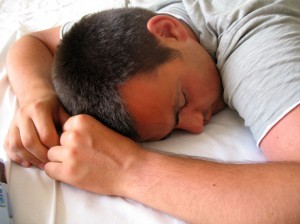Health tip for the day: use pillows that support your neck with a healthy curve while you sleep!
Good Health – smart ways to stay well, eat right, get fit
Do You Get Enough of This Powerful Immune Booster???
Americans don’t get enough sleep to stay healthy! Only about 1 in 4 gets a full 8 hours of sleep! Yet research shows that a person’s sleep amount is an important predictor of reduced immunity and susceptibility to sickness and disease. Humans with shorter sleep times have been shown to be more susceptible to viruses, bacterial infections, cancer and obesity.
Beat viruses with a good night’s sleep: a study at Carnegie Mellon University showed that individuals sleeping an average of less than 7 hours a night had almost 3 times (300%) greater incidence of sickness that did those who slept 8 hours or longer. Also, those with lower sleep efficiency were more likely to get sick. Sleep efficiency is the ratio of time spent sleeping compared to time spent in bed.
A good night’s sleep reduces cancer risk: another recent study concluded that women who exercised and got a full night’s sleep had the lowest incidences of breast and other cancers. However, women who exercised but got less than 7 hours of sleep a night had significantly higher cancer risk.
Sleep can also reduce the risk of excess weight and obesity. Inadequate sleep alters the level of key hormones that regulate the hunger signal, causing appetite stimulation.
What should you do if you can’t sleep???
Stay away from prescription drugs because all they do is put you into a stupor that resembles sleep but is not sleep and does not confer any of the benefits of sleep. One of the best foods for the sleep deprived is sunflower seeds because they contain high levels of 4 nutrients that are very important for sleep. Taking a safe, high quality melatonin supplement for adults over 35 may also help promote healthy sleep.
*Article from www.alignlife.com
Secrets to More Shut-Eye
 Did you know that over 60% of the American population knows that they need more sleep? This goal is important to them. But only half of them accomplish their goal. On average, we get between six and seven hours of sleep a night.
Did you know that over 60% of the American population knows that they need more sleep? This goal is important to them. But only half of them accomplish their goal. On average, we get between six and seven hours of sleep a night.
We need between eight and ten hours on any given night.
That means that Americans are a nation of sleep-deprived zombies.
There are a lot of reasons why people lose sleep:
We want to get more done. We want to spend time with friends or family. Just one more television program. And the end result is that we might get more done, once. After that we’re cranky, tired, unable to focus, and less productive. Friends and family don’t want to spend time with us because we’re irritable and tend to snap at the smallest slight.
But the single most commonly blamed reason for not getting enough sleep on a nightly basis is stress. According to the American Psychological Association survey, 43% of people say they lie awake at night feeling stressed. We have more tasks than we have time for and because we don’t know how to say no at the proper times, we give up hours of sleep worrying about the things that did not get done.
In order to allow our minds to relax, even with things left undone, learn how to reduce your sensations of stress.
First, write a list of all the things that need to be done. By writing it down, we allow our mind to think, “OK, someone’s taken care of it, I can rest now.” Not everyone finds it as easy as this, but writing notes or lists is one way to put your mind at ease.
Eat and drink sleep-inducing foods and beverages. Warm milk, chamomile tea, and cherry juice have all been reported to aid in wooing slumber. Eating almonds for their magnesium, or cheese and crackers for the calcium can also help.
Keep all electronics out of the bedroom. LCD light actually interferes with the body’s production of melatonin. Melatonin is the hormone that makes us sleep. Some people even resort to taking melatonin supplements to help them get improved shut-eye.
If you are awake for longer than 30 minutes, it is often better to get up and do something quiet and gentle. Don’t turn on bright lights, but even reading for a few minutes can take your mind off the fact that you can’t sleep enough to help you relax enough to finally drop off. Just don’t do work when you wake up. Have a book of essays or poetry on hand for those nights.
Follow this advice from Synergy Healthcare: Have a healthy sleep routine and stick to it. Don’t allow anyone to penetrate your sleep boundaries. You know when you feel sleepy. You don’t have to wait until your partner feels like going to bed before you do. You are the one who will pay the price for not getting enough sleep.